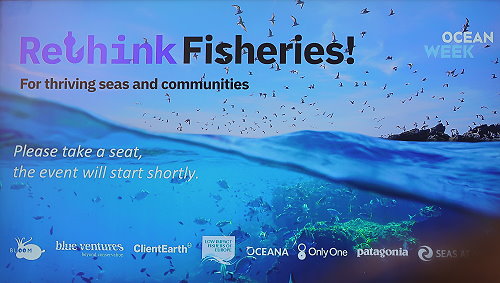 From 30 September to 4 October 2024 it was Ocean Week in and around the European Parliament organised by 'blue NGOs' in Brussels, led by Seas At Risk, BirdLife Europe and Central Asia, ClientEarth, Oceana, Surfrider Foundation Europe, and WWF. Supported by some 140 organisations, including Mundus maris, they launched the new 'Blue Manifesto' for a healthy and productive ocean. It identifies 50 concrete cross-cutting and sectoral policy asks, thus providing a clear roadmap towards a healthy ocean in 2030. The event 'Rethinking fisheries' convened in a big tent in front of the Parliament on 1 October was an excellent opportunity to cast light on the changes urgently needed to rebuild resources and enable prosperous low impact fisheries.
From 30 September to 4 October 2024 it was Ocean Week in and around the European Parliament organised by 'blue NGOs' in Brussels, led by Seas At Risk, BirdLife Europe and Central Asia, ClientEarth, Oceana, Surfrider Foundation Europe, and WWF. Supported by some 140 organisations, including Mundus maris, they launched the new 'Blue Manifesto' for a healthy and productive ocean. It identifies 50 concrete cross-cutting and sectoral policy asks, thus providing a clear roadmap towards a healthy ocean in 2030. The event 'Rethinking fisheries' convened in a big tent in front of the Parliament on 1 October was an excellent opportunity to cast light on the changes urgently needed to rebuild resources and enable prosperous low impact fisheries.
The big tent in front of the European Parliament on the Esplanade Solidarność was filled to capacity and many participants did not find a seat. Participants were milling around, catching up with one another and sneaking in and out to catch a glimpse of the exhibition cubes on three emblematic cases of small-scale fishers in Denmark, Ireland and Spain.
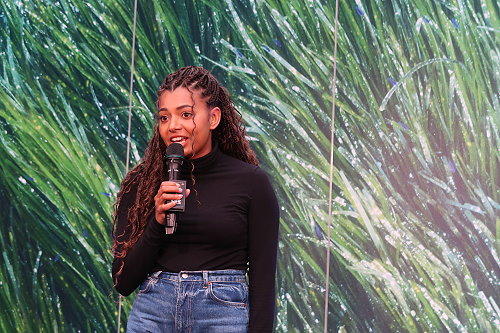 Calling the audience to order the event started with some live string music to get everybody's attention, body and soul.
Calling the audience to order the event started with some live string music to get everybody's attention, body and soul.
To further set the scene, Inka Cresswell, Oceanographer and filmmaker from the UK, asked 'How can seafood production support marine regeneration – and vice versa?'
Her own experience from dives and collaborations around the globe illustrated by amazing images provided some initial answers and food for more thought.
The remainder of the programme was structured into three panel discussions interspersed by music and video footage and moderated by Tobias Troll of Seas At Risk and Gina Lovett of Patagonia.
The first panel focused the conversation on 'The future of fisheries'. The picture shows the panelists, starting from the right: Isabella Lövin (MEP), Didier Gascuel (Institut Agro Rennes), Brian O’Riordan (Low Impact Fishers of Europe, LIFE), Silvia Bartolini (European Commission), and moderator Tobias Troll.
Didier Gascuel spoke about what he called pêche-écologie meaning fisheries which make sure to minimise the impact of their catches, both in terms of quantities and the way they extract the resource as selectively as possible.
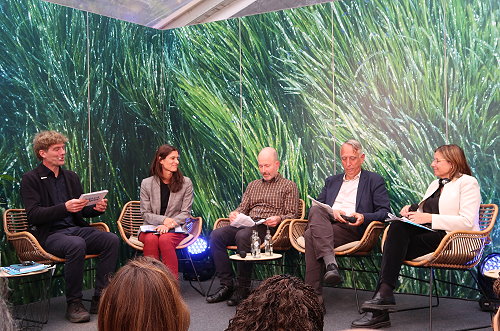 The Common Fisheries Policy mandates larger biomasses in the water than necessary to catch maximum sustainable yield (MSY). However, as big fish eat smaller ones and there are also other species interaction, top predators may be harvested in relation to the MSY concept, but certainly their prey species must not be as heavily fished.
The Common Fisheries Policy mandates larger biomasses in the water than necessary to catch maximum sustainable yield (MSY). However, as big fish eat smaller ones and there are also other species interaction, top predators may be harvested in relation to the MSY concept, but certainly their prey species must not be as heavily fished.
So, Didier argued strongly in favour of much more precautionary approaches for harvesting. He also emphasised that marine resources are a common good that must be used in ways creating benefits for all of society, not only some priviledged few.
MEP Isabella Lövin briefly recalled her active support to reform the Common Fisheries Policy (CFP) in the previous cycle. She regretted that its provisions were not implemented by Member States as required. Was it realistic to preserve and even recover stressed resources? She argued that it was possible provided there was the will and the insight of the greater benefits compared to the current declines.
This was all the more important as climate change led to massive temperature increases e.g. in the waters around the coast of Sweden, but also in other parts of the Baltic. Marine life could not cope with the twin stress of overfishing and high temperatures.
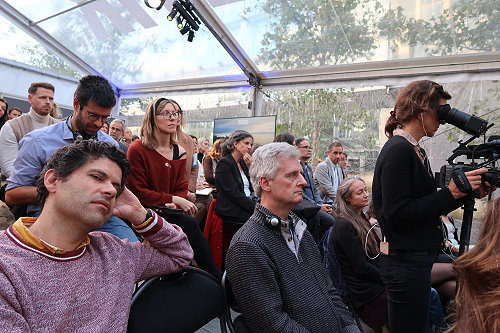 She thus advocated a blue transition to rebuild the abundance in marine ecosystems. In addition, in order to increase fairness in allocation of fishing quota, Isabella Lövin reminded the audience of Art. 17 of the CFP, which provides Member States with prerogatives for chosing who gets fishing quota, high or low impact fishers. The blue transition must also be a just transition creating opportunities for small-scale fishers.
She thus advocated a blue transition to rebuild the abundance in marine ecosystems. In addition, in order to increase fairness in allocation of fishing quota, Isabella Lövin reminded the audience of Art. 17 of the CFP, which provides Member States with prerogatives for chosing who gets fishing quota, high or low impact fishers. The blue transition must also be a just transition creating opportunities for small-scale fishers.
That was the perfect moment for Brian O'Riordan of LIFE to ground the aspirations in the context experienced by the members of his association. He observed that a lot had to change if policy and science wanted at least to keep what resources were left or even rebuild lost productivity. To project plans for the future, it was necessary to know and analyse the past. Future-proofing fisheries required reallocating quota from industrial vessels, particularly harmful bottom-trawling to low impact gears and set aside recovery areas. He invited the audience to look into the manifesto of the small-scale fishers in addition to reading the new Blue Manifesto.
Silvia Bartolini of DG Environment emphasised the need for dialogue between the environment policy, e.g. the Action Plan for protecting and restoring marine ecosystems for sustainable use and the CFP on the one hand and EU Member States on the other. The Action Plan contributes to delivering on the EU Biodiversity Strategy for 2030 and its commitment to legally and effectively protect 30% of our seas, with one third being strictly protected in line with agreed international commitments. She suggested that Sweden and Greece with their announcement to phase out bottom trawling were setting good examples.
In the ensuing debate Isabel Lövin cautioned that it should not be allowed that a few strong economic actors in what was, after all, a small economic sector, to empty the ocean for lack of strong oversight or allow herring, a preferred food fish in Sweden to be almost entirely be reduced to fish meal for Norwegian salmon.
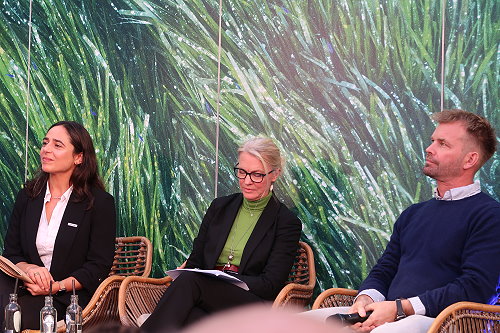 At this juncture, Brian O'Riodan recommended to pay attention to investors and hedge fund managers who were creeping into a range of policies and management measures in the guise of debt swaps for supposed environment protection. Or what would stop continued social dumping of fish food imported from jurisdictions with low social standards, so long as the commodities preferred by European consumers, namely white fish, canned tuna, shrimp and salmon fillets, be cheaply available. There was clearly a double standard without regard to decent living conditions and pay for European small-scale fishers.
At this juncture, Brian O'Riodan recommended to pay attention to investors and hedge fund managers who were creeping into a range of policies and management measures in the guise of debt swaps for supposed environment protection. Or what would stop continued social dumping of fish food imported from jurisdictions with low social standards, so long as the commodities preferred by European consumers, namely white fish, canned tuna, shrimp and salmon fillets, be cheaply available. There was clearly a double standard without regard to decent living conditions and pay for European small-scale fishers.
There was no shortage of required change as Didier Gascuel mentioned at the end of this panel. We can not continue to call our fisheries sustainable when there is at best 30% of the biomass in the water that would be needed to enable MSY, let alone any precautionary buffer to allow ecosystems to cope better with additional stress from climate change, pollution, habitat destruction and other stressors. So, the agenda of action is carved out for politicians and civil society alike.
The second panel was composed of (from right to left) David Lange (Danish small scale fishers producer organisation FSKPO), Jorid Hammersland (Permanent Representation of Sweden to the EU), and Vera Coelho (Oceana Europe). They discussed 'Bottom trawling and MPAs'.
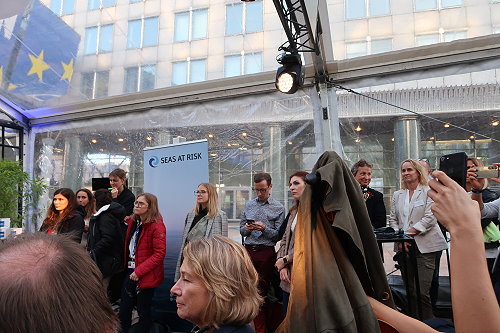 Vera Coelho opened the discussion by pointing out that there was good legislation in place, but low political appetite in EU Member States to implement it when it entailed some restrictions on activities.
Vera Coelho opened the discussion by pointing out that there was good legislation in place, but low political appetite in EU Member States to implement it when it entailed some restrictions on activities.
Jorid Hammersland informed that the government of Sweden had introduced a bill to restrain bottom trawling by Swedish vessels at least in Marine Protected Areas. The government hoped to focus attention to management for rebuilding a healthy resource.
David Lange admitted that it was often hard to address the necessary restrictions within the sector, after all, fishers small- and large-scale knew each other and understood the hardship for those with a big investment and perhaps loans to repay to stop or even reduce operations. However, he also pointed out that large industrial vessels had profitability issues, while small-scale fishers in his organisation were relatively better off as their high quality product fetched normally good prices. He underlined that fishing was excellent around the Oresund, where trawling was prohibited for security reasons.
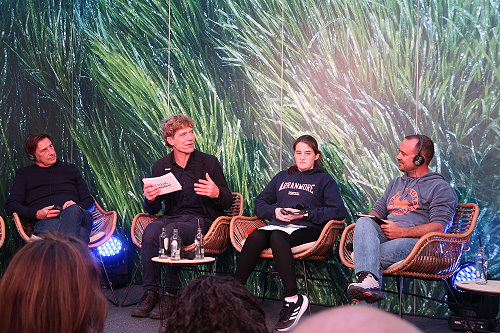 Vera could thus summarise that many public discourses were based on a false dichotomy in that continuing on the present path of widespread overfishing was not the question. The real issue was how to manage the transition towards healthy and productive resources as sources of food, employment and vibrant coastal economies.
Vera could thus summarise that many public discourses were based on a false dichotomy in that continuing on the present path of widespread overfishing was not the question. The real issue was how to manage the transition towards healthy and productive resources as sources of food, employment and vibrant coastal economies.
The third panel was composed of small-scale fishers sharing their experiences on how they were constantly seeking better ways to eeke out a decent living in the face of policies predominantly in favour of industrial operations.
'Make Fishing Fair' was the title of these fisher testimonials from left to right on the photo: Gwen Pennarun (Association ligneurs pointe de Bretagne, France), - Tobias Troll as moderator - Muireann Kavanagh (Ireland), and Isaac Moya Bofill (Empescat, Spain). This was set against the backdrop of the SAR/LIFE report “Fisheries for a new era” on alternative business models in small scale fisheries that work despite the odds, including the ones presented by the panelists.
Throughout all testimonials the audience learnt about the multiple ways in which the regulations are to the disadvantage of coastal fishers who need considerable creativity and tenacity to make ends meet all the same.
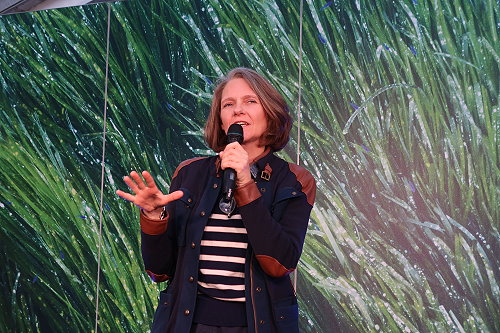 It fell to Claire Nouvian from Bloom in her closing remarks to resituate the sets of arguments, facts and practical experiences in the broader picture of a gaping distance between what we know and what we do.
It fell to Claire Nouvian from Bloom in her closing remarks to resituate the sets of arguments, facts and practical experiences in the broader picture of a gaping distance between what we know and what we do.
She harked back to the IPCC reports and reminded the audience that the scientific evidence was on the table since 1972 with the 'Limit of Growth' report by the Club of Rome.
The did not mince her words when confronting the industrial fisheries lobby and other economic interests who were seeding confusion, trading lies and engaging in a range of dubious practices to pursue their short-term profit objectives at the expense of everybody else.
She appealed to the audience not to get confused and rather apply the collaborative strengths of civil society organisations with small-scale fishers and all those committed to a healthy ocean.
Claire assured the politicians and elected representatives that in the face of the evidence presented at the event and even much earlier they should stop listening to the lobbies and shift the balance towards a true pact for a healthy ocean and fair sharing of benefits.
In many ways the event was a superb expression of how the spirit of the ecosystem approach to fisheries could work - with fair knowledge and benefit sharing, with stakeholder participation and attention to minimising the impact on the environment while putting high quality marine products on the table.
Text and all photos by Cornelia E Nauen.









